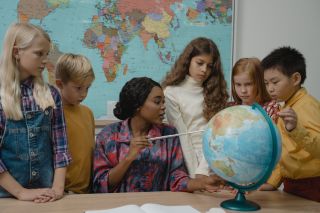Education
Talk for Resilience: Lessons From Ukrainian Schools
Conversations are the key to restoring children's humanity.
Posted August 30, 2023 Reviewed by Ray Parker

How do we talk to children about war—when they’re in the midst of a war?
How do we help children move away from hate and a black-and-white sense of friends and enemies?
How do we help children disagree in a way that feels productive?
How can we help children with different perspectives stay friends?
In a recent interview with the team at EdCamp Ukraine, a community of over 40,000 Ukrainian educators, I had the privilege of engaging in a thought-provoking conversation about the future of education in Ukraine.
This group is on a mission to reshape the educational landscape of Ukraine by creating an innovative approach to learning. Alongside their projects in Ukrainian schools, they are working to develop a book that reimagines education, drawing upon our existing knowledge of educational reform and interviewing experts in resilience.
To foster resilience, we need back-and-forth talk
One key aspect that stood out during our discussions was their profound interest in fostering resilience in children who have experienced traumatic events—and in helping the adults who work with children as well. When considering how to heal a nation, we need to think not only of the younger generation, but also of the effects on the teachers, parents, grandparents, and relatives who have suffered and are continuing to suffer.
This lesson is true in Ukraine, but equally in the United States and other countries, where the pandemic has left many children, educators, and other adults traumatized and feeling the effects of isolation, quarantine, and related grief.
It’s not only the trauma that children are dealing with after war or other traumatic events. It’s also the shift in their beliefs, as they go from relative innocence to feeling as if those around them are either “friends” or “enemies.”
To help children see nuance, we need to help ourselves
A few months back, when I gave the keynote speech at EdCamp, I was struck by the depth of their questions and the sincerity of their concerns. They pondered how we could help children and adults regain their composure and focus on learning when they were grappling with the emotional scars of trauma.
One question that particularly resonated with me was, "How can we guide children to see life beyond the simplistic categorizations of friends and enemies?" This seemingly simple question holds immense significance.
Many children, they told me, naturally formed harsh categories in their minds: either “you think like me” or “you disagree with me.” It’s often “I’m right” and “you’re wrong.” There may be little room for discussion or debate.
This isn’t only about which nation you belong to. It’s also about how you feel about an issue; where your opinions or perspectives lie.
While making these categories can be a natural response to trauma, it can lead to a sort of burrowing. Children go deep into their own beliefs and perspectives—often drawn primarily from their parents—and have a hard time looking up and out.
It made me realize that irrespective of where they are in the world, children face challenges with understanding how others think or act unlike them, whether due to traumatic experiences or the everyday struggles of life.
As a society, we are still grappling with how to communicate effectively in the face of differences of opinion. Just take a look at the front pages of most newspapers to see how polarized opinions have become.
This realization led me to explore the concept of "Rich Talk Schools"—places where the community comes together to establish a common understanding of how to engage in meaningful conversations with children.
Resilience and empathy can be nurtured together
This framework is not just a one-size-fits-all solution. Instead, it’s a dynamic, constantly evolving approach to education. It starts from the ground up, aiming to help children view conflicts as opportunities for growth and understand others as fellow humans navigating similar challenges. It also helps adults who face similar challenges open up to different perspectives—which is, at times, all of us. It involves a back-and-forth between adults and kids, not only lecturing “at” children but also helping stretch and expand their ideas and beliefs.
To implement this framework, we need to ask essential questions, such as:
- How can we not only listen but show we are listening, in a way that helps the other person feel seen and heard?
- How can we foster empathy in a way that goes beyond “I sympathize with you,” and allows children to feel into others’ hearts and minds?
- How can teachers receive the support they need from school administrations, principals, and families at home?
Empowering educators is vital in this journey, as they play a pivotal role in shaping the next generation. By providing them with the tools, understanding, and respect they deserve, we can create a nurturing environment where meaningful dialogues thrive.
This is especially crucial in today's world, where we are constantly bombarded with information and perspectives from a range of news media, some of which are misleading or overblown. To help children think critically, we need to start with them: by asking what they know and how they know it, checking in before we start lecturing.
This goes for parents; if we can work with what kids already think and know, rather than swooping in and trying to teach them lessons, we’re far better positioned to help them understand the world around them and make meaning of what they read, see, and hear.

Start with what kids understand and wonder about, at home and in school
Redefining education in Ukraine, and indeed around the world, is a multifaceted endeavor. It goes beyond textbooks and exams; it's about nurturing resilience, empathy, and collaboration in our future generations.
"Rich Talk Schools" represents a promising step towards this goal, offering a framework that could revolutionize the way we communicate with and educate our children. It's time to bridge the gap and create a world where understanding, dialogue, and respect flourish, no matter the challenges we face.




